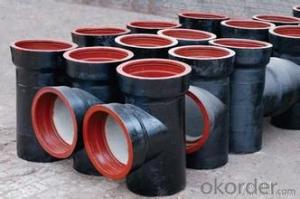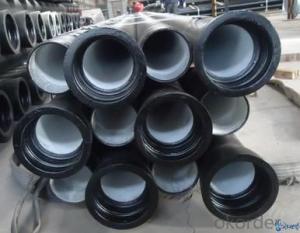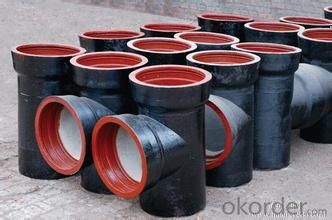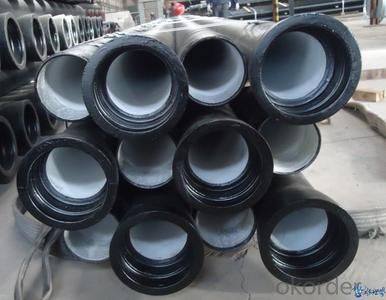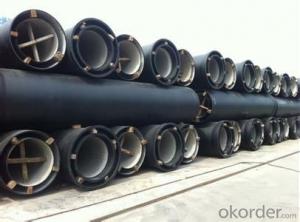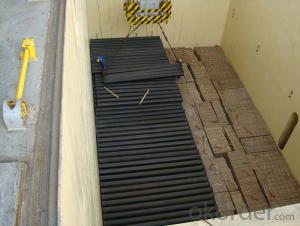DUCTILE IRON PIPE K9 DN1000
- Loading Port:
- China Main Port
- Payment Terms:
- TT OR LC
- Min Order Qty:
- -
- Supply Capability:
- -
OKorder Service Pledge
OKorder Financial Service
You Might Also Like
Ductile Iron Cast Pipe is without any defects compare with tradition casting tech, which has many advantages particularly as follow:
(1) High density. In the "vertical upward casting" process, the melt iron of centre liquid column in center crystallizer is continuously feeding for volume shrinkage caused by condensation tube at outer circumference , which lead to be free of shrinkage porosity.
(2) High purity. When melt iron pouring, the mixed impurities such as gas, dross, sand grain which are lighter than melt iron could be eliminated at furnace mouth, its impossible to enter into the crystallizer through the channel, so the melt iron into the crystallizer is very pure.
(3) Strength with toughness. The cooling speed provided by continuous crystallizer is 30 times than sand casting and 5 times than centrifugal casting, and doesn't produce white iron, the eutectic cell volume of continuous cast iron is one eighth to one tenth compare with traditional cast iron. The density of graphite nodule in ductile iron can reach 300-700 pcs/mm2. Therefore, all reason above improve the strength and toughness of continuous cast iron.
(4) Free machining. The high speed cooling make the hardening phase (such as boride, steadite) not appear like reticular, massive or thick, but diffuse like fish bone and pane in shape, moreover, there are tiny graphite flakes inlaid hardening phase. It's free machining in BrinellHardness the range of 250-300HB. However, the Brinell Hardness of 250 is top limit to common metal materials.
(5) Uniform composition of tube wall. The convection mixing of liquid column caused by marching type drawing in crystallizer make the composition of tube wall well-distributed, and concentration gradient very little.
(6) High productivity. To the wall thickness of tube under 10mm, the speed of continuous casting is 1 meter/min, to the wall thickness of tube under 20mm, the speed of continuous casting is 0.5 meter/min, which is high efficiency that centrifugal or other casting tech couldn't reach.
- Q: Is the cast iron pipe buried in need of antiseptic treatment? What kind of anticorrosive materials are used?
- Need general brush oil can.
- Q: Can ductile iron pipes be used for railway bridges?
- Indeed, railway bridges can utilize ductile iron pipes. Ductile iron, a resilient and sturdy form of cast iron, possesses remarkable tensile strength and flexibility. These characteristics render it suitable for a wide array of uses, railway bridges included. Ductile iron pipes serve as ideal building materials for various railway bridge elements, such as supports, beams, and columns, providing not only structural stability but also the ability to endure substantial loads and vibrations associated with railway traffic. Moreover, ductile iron pipes exhibit resistance to corrosion, a vital attribute for railway bridges that face exposure to outdoor conditions. Consequently, ductile iron pipes represent a viable and effective choice for constructing railway bridges.
- Q: Can ductile iron pipes be used for both water and wastewater applications?
- Yes, ductile iron pipes can be used for both water and wastewater applications. Ductile iron pipes are known for their strength and durability, making them suitable for conveying both water and wastewater. They have excellent corrosion resistance and can withstand high pressures, making them a reliable choice for various applications in the water and wastewater industry.
- Q: What is the expected joint restraint method for ductile iron pipes?
- Typically, when it comes to joint restraint methods for ductile iron pipes, the two commonly used options are mechanical joints or push-on joints. Both of these joint types are reliable and prevent leaks, ensuring the stability and integrity of the pipeline system. Mechanical joints involve the use of rubber gaskets and bolts to tightly seal the joints, while push-on joints rely on a groove and rubber gasket system to create a watertight seal. Both methods have excellent joint restraint capabilities and allow for the smooth transmission of fluids or gases through the pipeline without any risk of joint separation or failure. Moreover, these joint restraint methods also make installation and maintenance easier, which is why they are often preferred for ductile iron pipe systems.
- Q: Can ductile iron pipes be used in contaminated groundwater systems?
- Yes, ductile iron pipes can be used in contaminated groundwater systems. Ductile iron pipes are known for their high strength and durability, making them suitable for various applications including water and wastewater systems. They have corrosion resistance properties that protect against internal and external corrosion, making them a reliable choice for transporting water, even in contaminated groundwater systems. When dealing with contaminated groundwater, it is essential to consider the level and type of contamination present. Ductile iron pipes are resistant to many common chemicals found in groundwater, such as certain acids and alkalis. However, in cases of severe or specific chemical contamination, it may be necessary to consider alternative pipe materials that offer better resistance to those specific substances. Furthermore, proper installation and maintenance practices are crucial to ensure the long-term performance of ductile iron pipes in contaminated groundwater systems. Regular inspections, cleaning, and the use of appropriate protective coatings can help mitigate any potential risks associated with contamination. Overall, ductile iron pipes can be effectively used in contaminated groundwater systems, provided the level and type of contamination are within acceptable limits and proper installation and maintenance practices are followed. It is always recommended to consult with experts and consider local regulations and guidelines when making decisions regarding the suitability of pipe materials in specific groundwater systems.
- Q: Can ductile iron pipe be used for industrial applications?
- Yes, ductile iron pipe can be used for industrial applications. Ductile iron pipes are known for their durability, strength, and resistance to corrosion, making them suitable for various industrial settings. They can handle high-pressure and heavy-duty applications, making them ideal for industries such as water and wastewater, oil and gas, and chemical processing.
- Q: How do ductile iron pipes handle concentrated loads?
- Ductile iron pipes are designed specifically to effectively handle concentrated loads. Their unique composition and manufacturing process give them excellent strength and durability, making them highly resistant to cracking or breaking under heavy loads. One of the main features of ductile iron pipes is their high tensile strength, allowing them to withstand concentrated loads without deforming. During the production process, small amounts of magnesium are added to cast iron, transforming the brittle graphite flakes into nodular graphite. This modification greatly enhances the material's strength and ductility, enabling it to handle concentrated loads more effectively. Furthermore, ductile iron pipes have a high modulus of elasticity, meaning they can deform elastically under a load and then return to their original shape once the load is removed. This property allows the pipes to evenly distribute the concentrated load along their entire length, reducing stress concentrations and minimizing the risk of fractures or failures. Additionally, ductile iron pipes have a thick and robust wall thickness, ensuring exceptional structural integrity. This thickness enables the pipes to bear significant loads and withstand pressure variations without compromising their overall performance. In conclusion, ductile iron pipes are engineered specifically to handle concentrated loads due to their high tensile strength, elastic deformation capabilities, and thick wall thickness. These characteristics make them a reliable choice for a variety of applications, including water and wastewater systems, as they can withstand external forces without compromising their structural integrity.
- Q: Will the quality of ductile iron shrink?
- This is a ductile iron is prone to problems, manhole covers, large flat pieces, you have to see clearly, and some appear to be concave, not shrink, it may be caused by large gas emissions, not out
- Q: How can the ductile iron pipe be tested?
- In the hydraulic test, the ductile iron pipe can not be close to the back, support, pipe end and so on. The inspection must be carried out after all stops
- Q: What is the weight of a typical ductile iron pipe?
- The weight of a typical ductile iron pipe can vary depending on its diameter, length, and thickness. However, a common range for ductile iron pipes is between 1 to 5 pounds per foot.
Send your message to us
DUCTILE IRON PIPE K9 DN1000
- Loading Port:
- China Main Port
- Payment Terms:
- TT OR LC
- Min Order Qty:
- -
- Supply Capability:
- -
OKorder Service Pledge
OKorder Financial Service
Similar products
Hot products
Hot Searches
Related keywords
